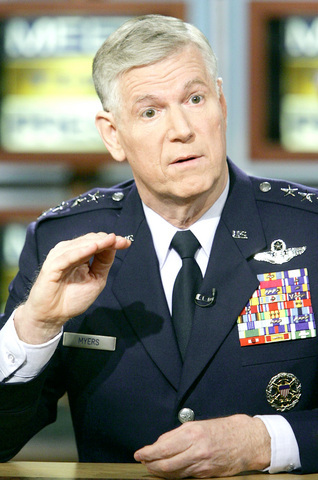In a television interview on Sunday, the top US military commander reiterated Washington's displeasure with China's "Anti-Secession" Law, saying that threatening to use force against Taiwan was not in China's interest.
In an interview on NBC News' Meet the Press, General Richard Myers, the chairman of the Joint Chiefs of Staff, was asked by the show's host, Tim Russert, if the US would intervene in a cross-strait crisis.
"If, in fact, the Chinese invaded or attacked Taiwan, would we defend Taiwan?" Russert asked.

PHOTO: AFP
"Well, the president has said, and I think it's the most powerful statement that we can refer to, and that is ... no change of the status quo by force by either side," Myers said.
"So clearly, it's not in anybody's interest to settle this by force," the general said.
On March 14, China's National People's Congress passed the "Anti-Secession" Law, which formally authorizes the use of "non-peaceful means" to unify with Taiwan.
Several countries, notably the US and Japan, have described the law as "unhelpful" and a potentially destabilizing action by the authoritarian regime in Beijing.
Myers ducked a question from Russert on whether US President George W. Bush's previous statement -- that the US would do "whatever it takes" to defend Taiwan -- still applied.
Reading from a transcript of a 2001 interview with Bush, Russert said:
"Question: `If Taiwan were attacked by China, do we have an obligation to defend the Taiwanese?' Bush: `Yes, we do.' `And you would?' President Bush: `And the Chinese must understand that. Yes, I would.' Question: `With the full force of [the] American military?' President Bush: `Whatever it took to help Taiwan defend herself.'"
Russert then asked Myers if that was still US policy.
"That's -- obviously the president makes that policy, he's the one that makes those decisions," Myers said. "And the military will do what we have to do."
Myers was appointed the 15th chairman of the Joint Chiefs of Staff on Oct. 1, 2001. The chairman serves as the principal military adviser to the US president, secretary of defense and National Security Council.

CHAOS: Iranians took to the streets playing celebratory music after reports of Khamenei’s death on Saturday, while mourners also gathered in Tehran yesterday Iranian Supreme Leader Ayatollah Ali Khamenei was killed in a major attack on Iran launched by Israel and the US, throwing the future of the Islamic republic into doubt and raising the risk of regional instability. Iranian state television and the state-run IRNA news agency announced the 86-year-old’s death early yesterday. US President Donald Trump said it gave Iranians their “greatest chance” to “take back” their country. The announcements came after a joint US and Israeli aerial bombardment that targeted Iranian military and governmental sites. Trump said the “heavy and pinpoint bombing” would continue through the week or as long

TRUST: The KMT said it respected the US’ timing and considerations, and hoped it would continue to honor its commitments to helping Taiwan bolster its defenses and deterrence US President Donald Trump is delaying a multibillion-dollar arms sale to Taiwan to ensure his visit to Beijing is successful, a New York Times report said. The weapons sales package has stalled in the US Department of State, the report said, citing US officials it did not identify. The White House has told agencies not to push forward ahead of Trump’s meeting with Chinese President Xi Jinping (習近平), it said. The two last month held a phone call to discuss trade and geopolitical flashpoints ahead of the summit. Xi raised the Taiwan issue and urged the US to handle arms sales to

State-run CPC Corp, Taiwan (CPC, 台灣中油) yesterday said that it had confirmed on Saturday night with its liquefied natural gas (LNG) and crude oil suppliers that shipments are proceeding as scheduled and that domestic supplies remain unaffected. The CPC yesterday announced the gasoline and diesel prices will rise by NT$0.2 and NT$0.4 per liter, respectively, starting Monday, citing Middle East tensions and blizzards in the eastern United States. CPC also iterated it has been reducing the proportion of crude oil imports from the Middle East and diversifying its supply sources in the past few years in response to geopolitical risks, expanding

An Emirates flight from Dubai arrived at Taiwan Taoyuan International Airport yesterday afternoon, the first service of the airline since the US and Israel launched strikes against Iran on Saturday. Flight EK366 took off from the United Arab Emirates (UAE) at 3:51am yesterday and landed at 4:02pm before taxiing to the airport’s D6 gate at Terminal 2 at 4:08pm, data from the airport and FlightAware, a global flight tracking site, showed. Of the 501 passengers on the flight, 275 were Taiwanese, including 96 group tour travelers, the data showed. Tourism Administration Deputy Director-General Huang He-ting (黃荷婷) greeted Taiwanese passengers at the airport and